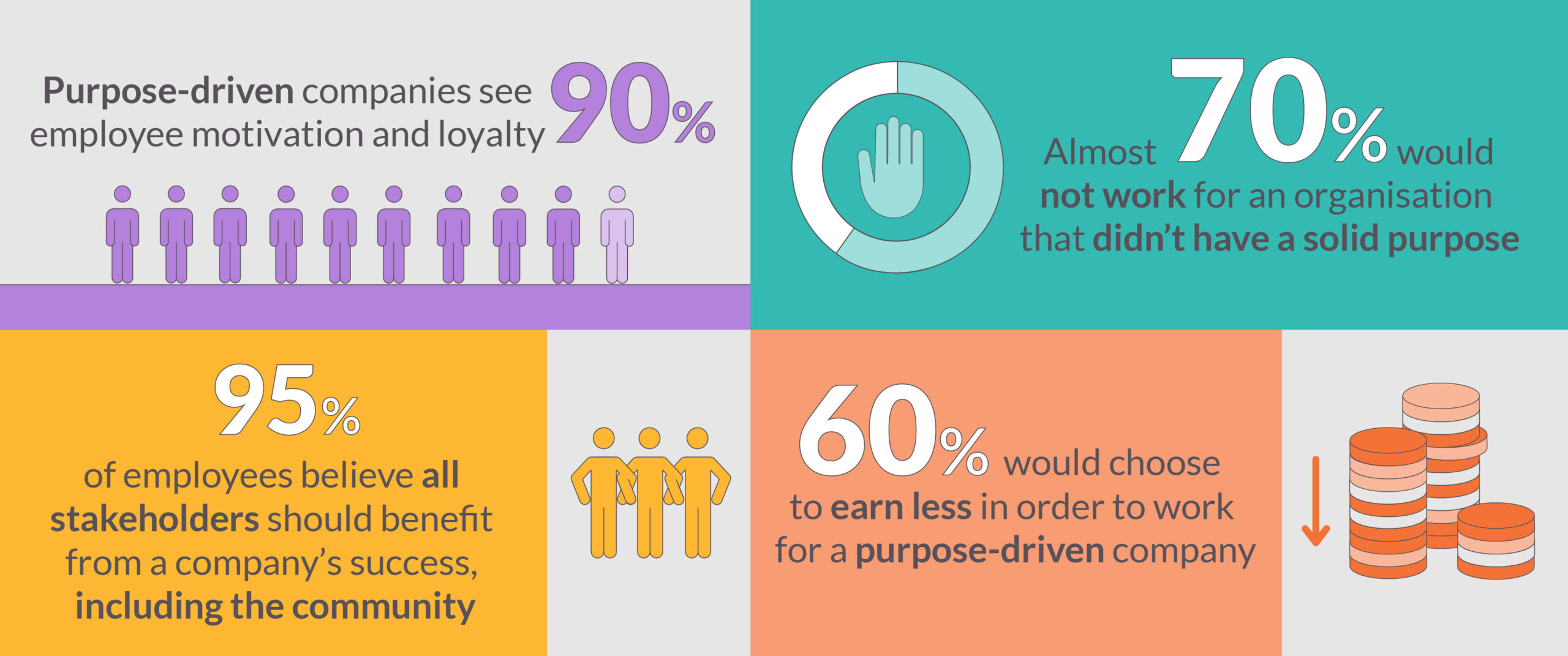A cultural transformation has occurred in the last couple of decades and is now undeniable: companies are now expected to assess, control, and leverage the impact they make in the world. It is no longer enough to be profitable; it is important to contribute to a sustainable planet and a fairer society; it is essential to have a purpose.
Data from an EVERFI consumer survey backs this up:

Beyond consumers’ perceptions, organisations also need to consider the expectations of their workforce 1:

People’s views shape the market. This societal change is now significantly affecting companies’ profits, with investors and banks using social and environmental impact as a criterion for funding an organisation:
- 58% of purpose-driven organisations grew 10% or more in three years, compared to 42% that are not purpose-driven 1
- Over 70% private equity companies in the UK have decided not to close a deal due to environmental, social, or governance concerns 2
- A strong ESG strategy results in an uptick of 10% to 20% in business valuation, and also attracts more interest from investors 3,4
- UK Government procurement teams will take 10% off an organisation’s score if it doesn’t have a solid CSR/ESG strategy
What is organisational purpose?
What does it mean to be driven by purpose? A company’s purpose is twofold: to solve issues for people and for the planet, and to not gain from causing problems. This means not only returning interests on investment, but reducing a company’s impact on the environment, delivering value for clients, providing meaning to employees, contributing positively to society, and encouraging positive changes and innovation.
.
‘A company’s purpose is to solve issues for people and for the planet’
Organisational purpose is often referred to in terms of Corporate Social Responsibility (CSR), Environmental, Social, and Governance (ESG) strategy, community engagement, corporate sustainability, or impact investing. These concepts differ in scale, scope, and intent, and their definition is also influenced by the department under which their responsibility falls.
In the UK, organisational purpose translates into programmes overseen by functions as varied as Human Resources, Marketing, and Public Affairs. More recently, there has been an increase in job roles focused specifically in driving organisational purpose: there is an increasing number of people heading departments of Responsible Business, Social Purpose, ESG, CSR, and similar functions.
What does social purpose look like?
While organisational purpose should run deep in corporate strategy and in all corporate activities, external stakeholders can normally see only the initiatives focused on improving society at large. These can include a variety of programmes, from short term to long, from a small scope to a significant impact. Here are a few examples, for reference and inspiration:
- Community outreach events and programmes
- Educational programmes, including skills development
- Investment in infrastructure and community spaces
- Awareness and behaviour change campaigns
- Knowledge sharing and early careers support
- Employee volunteering
- Sponsorships
Social purpose initiatives can also focus on a variety of community sectors, depending on an organisation’s industry, location, values, and social or environmental impact. A company may choose to focus on the community surrounding its local headquarters or to reach more broadly across a country; it may help the elderly or young mothers, children, young adults, former prisoners, unemployed people, and so on. A bank might want to offer its prospective clients financial education, a cosmetics company may choose to raise awareness of sun safety, a supermarket might sponsor a competition to help school children learn about healthy eating, and a technology company may help children develop STEM skills. Organisations can impact society in a myriad of ways.
Time for action
With the wide acknowledgement that it is imperative to be driven by organisational purpose and to practise corporate social responsibility, it is time to act. Any organisation not embedding an authentic mission into its strategy will be left behind by consumers, the workforce, and investors. What is your organisation’s purpose?







